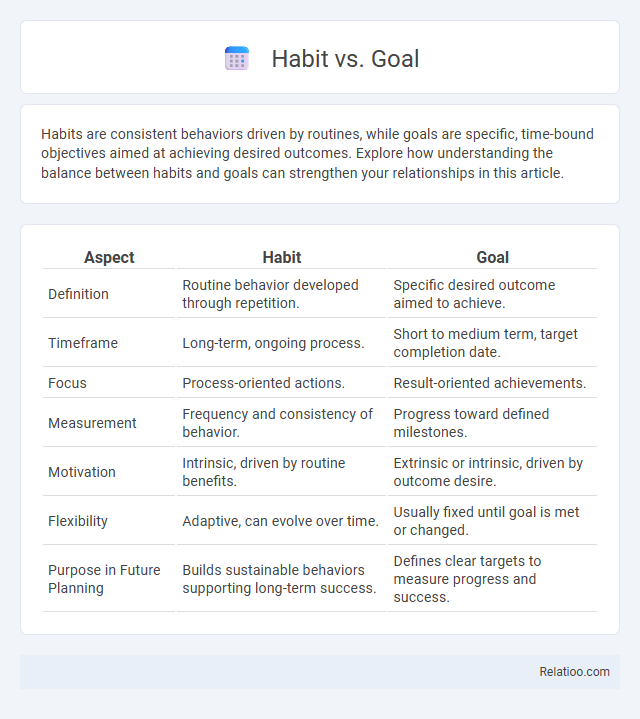Habits are consistent behaviors driven by routines, while goals are specific, time-bound objectives aimed at achieving desired outcomes. Explore how understanding the balance between habits and goals can strengthen your relationships in this article.
Table of Comparison
| Aspect | Habit | Goal |
|---|---|---|
| Definition | Routine behavior developed through repetition. | Specific desired outcome aimed to achieve. |
| Timeframe | Long-term, ongoing process. | Short to medium term, target completion date. |
| Focus | Process-oriented actions. | Result-oriented achievements. |
| Measurement | Frequency and consistency of behavior. | Progress toward defined milestones. |
| Motivation | Intrinsic, driven by routine benefits. | Extrinsic or intrinsic, driven by outcome desire. |
| Flexibility | Adaptive, can evolve over time. | Usually fixed until goal is met or changed. |
| Purpose in Future Planning | Builds sustainable behaviors supporting long-term success. | Defines clear targets to measure progress and success. |
Understanding Habits and Goals
Habits are automatic behaviors shaped by consistent repetition, while goals are intentional outcomes you strive to achieve through deliberate actions. Understanding the difference helps you design systems that reinforce positive routines rather than relying solely on goal-setting, which often leads to short-term motivation. By focusing on building strong habits, you create sustainable progress that supports your long-term objectives.
Key Differences Between Habits and Goals
Habits are automatic behaviors triggered by context, while goals are specific outcomes you consciously aim to achieve within a set timeframe. Habits focus on the process and consistency, shaping daily routines, whereas goals emphasize final results and measurable milestones. Understanding these key differences helps you design more effective strategies for personal growth and long-term success.
The Science Behind Habit Formation
The science behind habit formation reveals that habits develop through a neurological loop consisting of a cue, routine, and reward, which creates automatic behaviors over time. Unlike goals, which are conscious objectives focused on specific outcomes, habits become ingrained patterns that operate below conscious thought, making them more sustainable and resistant to change. Research in neuroscience and psychology demonstrates that understanding this process is critical for effectively replacing bad habits with positive ones, highlighting the brain's plasticity and the role of repetition in strengthening neural pathways.
Why Goals Can Fail Without Supporting Habits
Goals often fail without supporting habits because habits provide the consistent, automatic behaviors necessary to make progress. While goals set the desired outcome, habits create the structured daily actions that bridge the gap between intention and achievement. Developing strong habits embeds motivation into routine, preventing reliance solely on willpower and reducing the risk of abandoning goals prematurely.
Building Consistency: The Power of Small Habits
Building consistency hinges on the power of small habits that gradually shape your daily routine and long-term behavior. Unlike setting ambitious goals that may feel overwhelming, focusing on manageable habits ensures steady progress and sustainable change. Your ability to commit to these small, consistent actions ultimately transforms intentions into lasting success.
Aligning Habits With Long-Term Goals
Aligning habits with long-term goals enhances consistency and progress by ensuring daily actions directly support future aspirations. Effective habit formation involves breaking down goals into manageable, repetitive behaviors that reinforce desired outcomes over time. This alignment creates a sustainable feedback loop that drives motivation and measurable success in achieving long-term objectives.
Habit Stacking vs. Goal Setting Strategies
Habit stacking leverages the power of routine by linking new habits to established ones, creating a seamless behavioral chain that enhances consistency and reduces decision fatigue. Goal setting strategies emphasize defining clear, measurable objectives and deadlines to foster motivation and track progress effectively. Combining habit stacking with goal setting integrates daily actions with long-term aspirations, driving sustainable personal growth and achievement.
Measuring Progress: Habit Tracking vs. Goal Milestones
Habit tracking involves monitoring daily or routine behaviors to build consistency, often using apps or journals to record frequency and duration, which provides immediate feedback on progress. Goal milestones measure significant achievements or checkpoints within a broader objective, offering clear markers for success and motivation but may lack the granularity of daily habit data. Combining habit tracking with goal milestones ensures both continuous behavioral improvement and strategic progress toward larger ambitions.
Overcoming Obstacles: Breaking Bad Habits and Achieving Goals
Overcoming obstacles requires distinguishing between habits and goals, as habits are automatic behaviors while goals are deliberate outcomes. Breaking bad habits involves identifying triggers, implementing replacement routines, and maintaining consistency to rewire neural pathways. Achieving goals demands setting clear intentions, tracking progress, and adapting strategies to overcome challenges, ensuring long-term success and personal growth.
Integrating Habits and Goals for Sustainable Success
Integrating habits and goals ensures sustainable success by transforming long-term objectives into consistent actions that become part of your daily routine. Habits provide the automatic behaviors needed to achieve specific goals, reinforcing progress without requiring constant willpower or motivation. By aligning your habits with clear, measurable goals, you create a structured path that fosters continuous improvement and lasting achievement.

Infographic: Habit vs Goal
 relatioo.com
relatioo.com